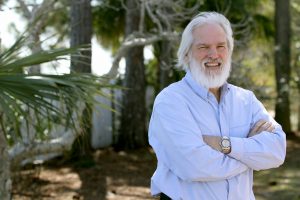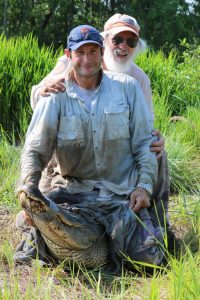GoMRI Mourns the Passing of Dr. Louis J. Guillette
– August 12, 2015
It is with deep sadness that we share the news that Dr. Louis “Lou” J. Guillette passed away on Thursday, August 6 in Charleston, South Carolina.
Guillette was a leader in hormone disruption research, receiving international recognition for his work on the effect of chemicals on wildlife reproductive anatomy, genetics, and physiology. His research in comparative reproductive biology and developmental endocrinology provided insights into chemical impacts on human health. Among his discoveries was that alligators can serve effectively as sentinel species for environmental contaminant exposure.
“We are deeply saddened by the loss of Dr. Guillette,” said Dr. Rita Colwell, Chair of the Gulf of Mexico Research Initiative Research Board. “Lou’s exquisite research in cell biology was focused on potential human health risks and in his GoMRI-funded work, he studied effects of petroleum dispersant compounds at the molecular level. Lou was a dedicated researcher and a good friend to all of us in the GoMRI family.”
Guillette served as Director of the Marine Biomedicine and Environmental Sciences Center and was Professor of Obstetrics and Gynecology at the Medical University of South Carolina (MUSC). He was also Professor of Developmental Biology at the Howard Hughes Medical Institute and held the Hollings Marine Laboratory Center of Economics Excellence Endowed Chair of Marine Genomics.
Guillette was Co-Principal Investigator with Dr. Demetri Spyropoulos, Professor of Pathology and Laboratory Medicine at the MUSC Hollings Cancer Center Children’s Research Institute, working together on petroleum dispersant components effects on embryonic stem cells.
“Lou and I became close collaborators several years ago after sharing with him our results that estrogens can impact the fundamental patterning of embryos, and we were planning more work together,” Spyropoulos said. He described his friend as a scientist’s scientist, a motivational speaker, a wildlife photographer, and a Renaissance man. “Lou made each of us feel special and motivated, showing us how to develop tools for asking, addressing, and answering significant questions. He didn’t teach us how to fish, he taught us how to teach ourselves to fish! Our experiences with him will last a lifetime. His scientific and personal legacy will continue to bear fruit in future generations of scientists.”
Dr. Greg Masson, with the Florida Wildlife Service Regional Environmental Quality and coordinator for the Natural Resource Damage Assessment, said, “Lou was first and foremost a gentleman and a driving force in describing new parameters in Endocrine Disrupting Contaminants. He was a true friend and will be greatly missed along with other stalwarts of endocrinology and toxicology.”
The Deputy Field Supervisor of the U.S. Fish and Wildlife Service, North Florida Ecological Services, Dr. Heath Rauschenberger said that Guillette’s greatest joy and legacy was mentoring his students and positively influencing those around him. “Lou was a high caliber researcher and his accomplishments made those of us conducting alligator research in different labs step up our game. I’m personally a better scientist because of him.”
Guillette mentored many graduate students, including Alexis Temkin and Theresa Cantu who are currently working on the GoMRI-funded project.
“Lou’s energy, passion, and commitment to great science brought me to MUSC, knowing that only great things could come from working with him,” said Temkin. “He taught me that being a successful and influential scientist is more than completing experiments and analyzing data, it included communicating our work to our peers and the public. We practiced this just as rigorously as our bench work. He was the most inspirational person I knew, and he will continue to inspire me every day.”
“He ignited a fiery passion for scientific curiosity that I didn’t know existed within me,” said Cantu. “He had an incredible ability to inspire his students to greatness and advocated for mentoring young scientists. I spent four weeks in South Africa last summer with him, and we had many campfire conversations about the future and how to be a successful scientist. I will forever be grateful to him.” Cantu chronicled her experiences through words and pictures which are available here.
Guillette was active in policy issues and testified as expert witness to the U.S. Congress and science policy adviser to governmental agencies on the linkages of environmental contamination and human health. He was a fellow of the American Association for the Advancement of Science and was well recognized as an outstanding scientist globally, having been appointed honorary professor at academic institutions in Japan, the Philippines, South Africa, and South America.
MUSC recently interviewed Guillette about his research, and you can watch that here. In 1997, PBS spoke with Guillette, and that interview is available here. A gallery of Lou’s beautiful wildlife photography is available here.
The GoMRI science community extends sincere sympathy to Dr. Guillette’s family, friends, and colleagues.
************
The Gulf of Mexico Research Initiative (GoMRI) is a 10-year independent research program established to study the effect, and the potential associated impact, of hydrocarbon releases on the environment and public health, as well as to develop improved spill mitigation, oil detection, characterization and remediation technologies. An independent and academic 20-member Research Board makes the funding and research direction decisions to ensure the intellectual quality, effectiveness and academic independence of the GoMRI research. All research data, findings and publications will be made publicly available. The program was established through a $500 million financial commitment from BP. For more information, visit https://gulfresearchinitiative.org/.
© Copyright 2010- 2017 Gulf of Mexico Research Initiative (GoMRI) – All Rights Reserved. Redistribution is encouraged with acknowledgement to the Gulf of Mexico Research Initiative (GoMRI). Please credit images and/or videos as done in each article. Questions? Contact web-content editor Nilde “Maggie” Dannreuther, Northern Gulf Institute, Mississippi State University (maggied@ngi.msstate.edu).







